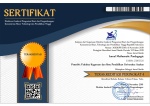ANALISIS KEMAMPUAN BERPIKIR KRITIS SISWA PADA MATERI SPLTV MELALUI MODEL PEMBELAJARAN PROJECT BASE LEARNING (PBL) BERBASIS STEM
Abstract
Abstract
This study aims to analyze students' critical thinking skills on SPLTV material through a Problem Based Learning model based on Science, Technology, Engineering, and Mathematics (STEM). The type of research used is descriptive qualitative. The research instrument used a test method in the form of critical thinking description questions to analyze the achievement of critical thinking skills and a questionnaire to determine student responses to the implementation of STEM-based PBL on SPLTV material. Research results students have been able to solve problems with a complete score of 73% and reach indicators of critical thinking skills, namely: the ability to generalize, the ability to identify, the ability to formulate problems into mathematical models, the ability to deduce using principles and the ability to provide further explanations. There were 8 students or 27% in the incomplete category and did not reach the indicators of critical thinking skills in working on the questions. Meanwhile, based on the student response questionnaire, it shows that the student response questionnaire with an average percentage of 80.68%, so it can be concluded that students gave a positive response to the implementation of STEM-based PBL learning on SVLTP material with a reliability of 0.82. Student responses at the time of the interview showed that learning with the STEM-based PBL model is a new model and has never been applied by teachers in learning
Keywords: Critical Thinking Analysis, STEM-Based PBL, SVLTP
Abstrak
Penelitian ini bertujuan untuk menganalisis kemampuan berpikir kritis siswa pada materi SPLTV melalui model Problem Based Learning berbasis Science, Technology, Engineering, and Mathematics (STEM). Jenis penelitian yang digunakan adalah kualitatif deskriptif. Instrumen penelitian menggunakan metode tes berupa soal uraian berpikir kritis untuk menganalisis ketercapaian kemampuan berpikir kritis dan angket untuk mengetahui respon siswa terhadap implementasi PBL berbasis STEM pada materi SPLTV. Hasil Penelitian siswa sudah mampu menyelesaikan soal dengan nilai tuntas 73% dan mencapai indikator kemampuan berpikir kritis yaitu : kemampuan menggeneralisasi, kemampuan mengidentifikasi, kemampuan merumuskan masalah ke model matematika, kemampuan mendeduksi dengan menggunakan prinsip dan kemampuan memberikan penjelasan lebih lanjut. Terdapat 8 orang siswa atau 27% dalam kategori tidak tuntas dan tidak mencapai indikator kemampuan berpikir kritis dalam mengerjakan soal. Sementara berdasarkan angket respon siswa menunjukkan bahwa angket respon siswa dengan persentase rata-rata 80,68%, sehingga dapat disimpulkan bahwa siswa memberikan respon positif terhadap implementasi pembelajaran model PBL berbasis STEM pada materi SVLTP dengan reliabititas sebesar 0,82. Tanggapan siswa pada saat wawancara menunjukkan bahwa pembelajaran dengan model PBL berbasis STEM merupakan model yang baru dan belum pernah diterapkan guru pada pembelajaran
Kata Kunci : Analisis Berpikir Kritis, PBL Berbasis STEM, SVLTP
Full Text:
PDFReferences
Cahyaningsih, Febriana ; Roektiningroem, E. (2018). Pengaruh Pembelajaran IPA Berbasis STEM-PBL Terhadap Keterampilan Berpikir Kritis Dan Hasil Belajar Kognitif. Pend. Ilmu Pengetahuan Alam-S1, 5, an 239-244.
DeJarnette, N. K. (2012). America’s children: Providing early exposure to STEM (science, technology, engineering and math) initiatives. Education, 133(March), 77–84.
http://www.ingentaconnect.com/contentone/prin/ed/2012/00000133/00000001/art00008
Dila, O. R., . M., & Zanthy, L. S. (2019). Analisis Kemampuan Berpikir Kreatif Matematis Siswa Tentang Materi Peluang. JPMI (Jurnal Pembelajaran Matematika Inovatif), 2(4), 155. https://doi.org/10.22460/jpmi.v2i4.p155-160
Laforce, M., Noble, E., & Blackwell, C. (2017). Problem-based learning (PBL) and student interest in STEM careers: The roles of motivation and ability beliefs. Education Sciences, 7(4). https://doi.org/10.3390/educsci7040092
Maltese, A., & Lung, F. (2015). Consultant Report Securing Australia ’ s Future STEM : Country Comparisons. May 2013, 1–92.
Smith, T. E., Rama, P. S., & Helms, J. R. (2018). Teaching critical thinking in a GE class: A flipped model. Thinking Skills and Creativity, 28(February), 73–83. https://doi.org/10.1016/j.tsc.2018.02.010
Syafitri, E., Armanto, D., Rahmadani, E., & Medan, U. N. (2021). Aksiologi kemampuan berpikir kritis. 4307(3), 320–325.
DOI: https://doi.org/10.36294/jmp.v6i2.2440
Refbacks
- There are currently no refbacks.





